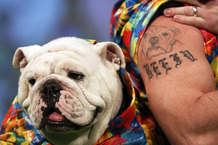Fast food delivery Jobs
 Seoul, South Korea — In densely populated Seoul, dodging motorcycles that zoom down sidewalks, run red lights, and cut across several lanes of traffic is part of everyday life.
Seoul, South Korea — In densely populated Seoul, dodging motorcycles that zoom down sidewalks, run red lights, and cut across several lanes of traffic is part of everyday life.
It also means lightning-quick delivery of pizza, fried chicken, and Chinese food.
But there has been a steady increase in the number of accidents involving motorcycle deliverymen, raising concerns that Korea's obsession with being fast may need to be adjusted.
In 2009, there were 1, 395, part of 4, 962 injuries or deaths involving motorcycles in the restaurant and lodging industry during the past six years. And a recent poll of delivery drivers showed nearly 50 percent of those using motorcycles had indicated they had been involved in a road accident during the course of their work.
Though separate figures for fatalities were not available, safety campaigners suggest they run into double digits during the past 10 years.
In an effort to tamp down on accidents, activists have been putting pressure on fast food firms and the government to keep businesses from putting near-impossible delivery deadlines on their drivers.
But others say it’s not just delivery drivers who are getting into accidents.
South Korea has one of the highest traffic accident rates among the world's most advanced economies. Kim Young-kyung, of the Youth Community Union, labor advocates for young people and job seekers, says it may not always be the motorcycle delivery drivers themselves who are to blame for accidents. She points to dangerous maneuvers taken by other road users in general.
 Enter vehicular black boxes, which record driving data and can be used in the event of an accident to assess fault.
Enter vehicular black boxes, which record driving data and can be used in the event of an accident to assess fault.
The tools may become mandatory for all vehicles within the next couple of years, says one government auto policy adviser.
“If drivers of cars or buses are presented with something that shows what they did, they can’t lie about what happened in accidents, ” says former deliveryman Jang Byoung-kwan.
Still, campaigners say they will continue to pressure fast food firms and the government to regulate delivery services. They say much of the risk-taking is a result of deliverymen fearing they'll lose their jobs if they are too slow.
In February, Domino’s Pizza called off its 30-minute delivery time guarantee under pressure from activists. Other chains are understood to have followed Domino's lead.
Then in March, the government and a number of fast food franchises agreed to work together to launch a safety-awareness campaign for delivery drivers.
Yet Jang, the former deliveryman, says the Korean habit for getting things done quickly is ingrained in the culture.





